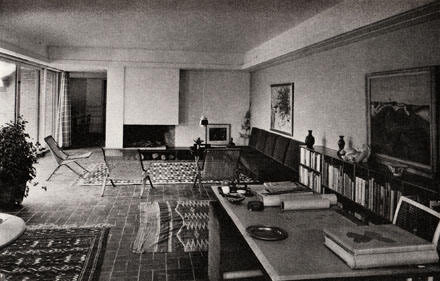Mogens Koch: Functional Elegance
Mogens Koch worked within the paradigm of functionalism to elegantly solve problems of spatial limitation and comfort. Best known for his furniture designs of the now classic modular bookcase system and his folding chair programme, Koch was a key figure in the golden age of Danish design during 1940’s and 1950’s alongside several generations of iconic Danish furniture designers including Kaar Klint, Borge Mogensen, Hans J. Wegner and Poul Kjaerholm.
Guided by the principals of the Danish functionalism tradition, Koch designed furniture that was functional, simplistic and comfortable. His commitment to the study of traditional furniture types such as classic Shaker and 18th century English furniture was also key in the expression of his work. Koch viewed design as an evolutionary development, with his furniture being viewed on the whole as modern reworks of classic furniture types.
Mogens Koch in his studio
“It’s important to get to the essence of the furniture’s functionality”
Koch’s commitment to a more idealistic view to developing cost effective furniture was also seen as key to his influence and legacy. So despite his furniture today fetching high auction prices, his approach was a shining example of a philosophy which valued efficient, practical and pragmatic means of manufacturing.
Born in Copenhagen in 1898, Koch graduated from the Royal Danish Academy of Fine Arts, under the guidance of Kaare Klint. Koch himself later became professor of Architecture from 1950 to 1968.
In 1928 Koch designed a simple, elegant bookcase system. While initially designed with his own home in mind, was later produced for the Danish furniture firm Rud. Rasmussen. Koch’s aim was to develop a simple, functional design which could be easily reconfigured to suit a variety of room formats and sizes. The thin solid wood profile also meant the modules could be stackable to form countless combinations without losing their aesthetic integrity.
Bookcase System 1928
Following this, in 1932 and in response to a brief supplied by the Danish Society of Ecclesiastical Art to design seating which could be quickly set up and taken down, Koch designed the ‘MK Safari” chair and a series of additional folding furniture pieces, including a stool and coffee table. This series became known as the ‘folding chair programme’ and the MK Safari chair remains one of Koch’s signature pieces.
Mogens Koch worked on all aspects of architecture, housing plans, houses, monuments, and even the design of craft objects and textiles, but it was the design of his furniture which remain his most prolific works. It was Koch's ability to embrace the indelible beauty found in tradition, while remaining committed to the process of design as evolution, cementing his vision of creating unfettered and functional furniture objects for modern living and comfort.








